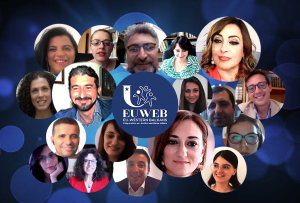
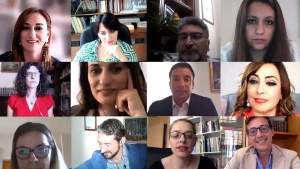
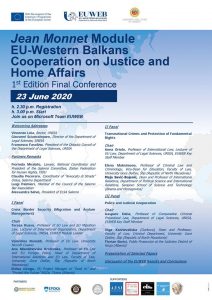
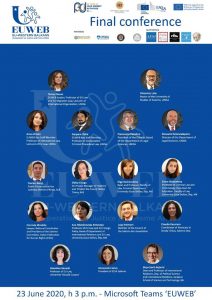
After all the planned training activities, the first edition of the Jean Monnet EU-Western Balkans Cooperation on Justice and Home Affairs Form, EUWEB is coming to an end.
The final Conference will take place on June 23, 2020 at 3 pm on the Microsoft Teams platform with the participation of distinguished speakers and experts in the field.
After the welcoming addressed of Vincenzo Loia, Rector, UNISA, Giovanni Sciancalepore, Director of the Department of Legal Sciences, UNISA and Francesco Fasolino, President of the Didactic Council of the Department of Legal Sciences, UNISA, it will be the turn of the supporters of the EUWEB Module thanks to the participation of Fiorinda Mirabile, Lawyer, National Coordinator and President of the Salerno Committee, Italian Human Rights Federation, FIDU; Claudia Pecoraro, Salerno Coordinator of the Onlus “Avvocati di Strada” ; Luigi Palmieri, Member of the Council of the Salerno Bar Association and Alessandra Salvo, President of ELSA Salerno.
Then the Conference will be divided into three Panels concerning the main thematic areas of the EUWEB Module and specifically: The Panel “Cross Border Security (Migration and Asylum Management)”which will be chaired by Teresa Russo, Professor of European Union Law, Department of Legal Sciences , UNISA, EUWEB Leader; II Panel “Transnational Crimes and Protection of Fundamental Rights”, which will be chaired by Anna Oriolo, Professor of International Law, Department of Legal Sciences, UNISA, EUWEB Key Staff Member; III Panel “Police and Judicial Cooperation”, which will be chaired by Gaspare Dalia, Professor of Comparative Criminal Procedure Law, Department of Legal Sciences, UNISA, EUWEB Key Staff Member.
The discussion will be conducted through the submission of questions to the speakers who will ensure a more dynamic development of all three panels that will see the participation for the I Panel I of Valentina Ranaldi, Professor of EU law, Niccolò Cusano University; Ana Nikodinovska Krstevska, Professor of EU Law and EU Foreign Policy, Director of the Department of International Relations and European Union Law, Faculty of Law, Goce Delčev University, Štip (Republic of North Macedonia) and Eldisa Cirogu, EU Project Manager of the NGOs “Soek In” and “Protect the Future”, Tirana (Albania); for the II Panel of Elena Maksimova, Assistant Professor, Vice-Dean of the Faculty of Law, Goce Delčev University, Štip (Republic of Northern Macedonia) and Maja Savić-Bojanić, Dean, Department of Political Sciences and International Relations, Professor of International Relations at the Sarajevo School of Science and Technology (Bosnia and Herzegovina); for the III Panel of Olga Koshevaliska (Gurkova), Dean and Associate Professor, Faculty of Law, Department of Criminal Law, Goce Delčev University, Štip (Republic of North Macedonia) and Florian Boriçi, Public Prosecutor at the Judicial District of Kruja ( Albania)
Sharing Ideas, Experiences and Best Practices in Jean Monnet Modules: EUWEB and SoEULaw Promote Excellence in EU and International Studies 15th October 2020
On 15th October 2020 from 9.00 am to 10.30 am, the Jean Monnet Modules EUWEB and SOEULAW celebrated #Erasmusplusdays with a webinar organised in partnership. The event aimed to increase dialogue between the two Jean Monnet communities sharing ideas, experiences and best practices.
Special Issue EU-Western Balkans Cooperation on Justice and Home Affairs (EUWEB) – ILLYRIUS International Scientific Review” n. 14 (II-2020) ISSN 2225-2894
1st Edition Final Conference Jean MOnnet Module EU-Western Balkans Cooperation on Justice and Home Affairs, EUWEB – 23 June 2020
After all the planned training activities, the first edition of the Jean Monnet EU-Western Balkans Cooperation on Justice and Home Affairs Form, EUWEB is coming to an end.
The final Conference will take place on June 23, 2020 at 3 pm on the Microsoft Teams platform with the participation of distinguished speakers and experts in the field.
After the welcoming addressed of Vincenzo Loia, Rector, UNISA, Giovanni Sciancalepore, Director of the Department of Legal Sciences, UNISA and Francesco Fasolino, President of the Didactic Council of the Department of Legal Sciences, UNISA, it will be the turn of the supporters of the EUWEB Module thanks to the participation of Fiorinda Mirabile, Lawyer, National Coordinator and President of the Salerno Committee, Italian Human Rights Federation, FIDU; Claudia Pecoraro, Salerno Coordinator of the Onlus “Avvocati di Strada” ; Luigi Palmieri, Member of the Council of the Salerno Bar Association and Alessandra Salvo, President of ELSA Salerno.
Then the Conference will be divided into three Panels concerning the main thematic areas of the EUWEB Module and specifically: The Panel “Cross Border Security (Migration and Asylum Management)”which will be chaired by Teresa Russo, Professor of European Union Law, Department of Legal Sciences , UNISA, EUWEB Leader; II Panel “Transnational Crimes and Protection of Fundamental Rights”, which will be chaired by Anna Oriolo, Professor of International Law, Department of Legal Sciences, UNISA, EUWEB Key Staff Member; III Panel “Police and Judicial Cooperation”, which will be chaired by Gaspare Dalia, Professor of Comparative Criminal Procedure Law, Department of Legal Sciences, UNISA, EUWEB Key Staff Member.
The discussion will be conducted through the submission of questions to the speakers who will ensure a more dynamic development of all three panels that will see the participation for the I Panel I of Valentina Ranaldi, Professor of EU law, Niccolò Cusano University; Ana Nikodinovska Krstevska, Professor of EU Law and EU Foreign Policy, Director of the Department of International Relations and European Union Law, Faculty of Law, Goce Delčev University, Štip (Republic of North Macedonia) and Eldisa Cirogu, EU Project Manager of the NGOs “Soek In” and “Protect the Future”, Tirana (Albania); for the II Panel of Elena Maksimova, Assistant Professor, Vice-Dean of the Faculty of Law, Goce Delčev University, Štip (Republic of Northern Macedonia) and Maja Savić-Bojanić, Dean, Department of Political Sciences and International Relations, Professor of International Relations at the Sarajevo School of Science and Technology (Bosnia and Herzegovina); for the III Panel of Olga Koshevaliska (Gurkova), Dean and Associate Professor, Faculty of Law, Department of Criminal Law, Goce Delčev University, Štip (Republic of North Macedonia) and Florian Boriçi, Public Prosecutor at the Judicial District of Kruja ( Albania)
6 march 2020
The EU Legal Challenges in the Digital Age: Cybersecurity and Cybercrime – 15 June 2020
Monday 15 June 2020 Teresa Russo, Anna Oriolo and Gaspare Dalia, EUWEB Leader and Key Staff Members examined the current and complex issue of the EU Legal Challenges in the Digital Age: Cybersecurity and Cybercrime.
After the introduction by Anna Oriolo and Teresa Russo concerning International Relations in the Cyberspace: The Digital Diplomacy, Daniela Marrani, Professor of European Union Law, Department of Economic and Statistical Sciences, DISES, UNISA dealt with the EU Cybersecurity Framework , while Gaspare Dalia, EUWEB Key Staff Member focussed on the National Tools for Preventing and Fighting Cybercrime: Legal and Deontological Perspectives which also permitted the participating lawyers to be awarded a training credit in deontology.
Finally, Raffaele Pizzolante, Professor of Digital Forensics, Department of Computer Science, UNISA analyzed the issue of Transnational Cybercrime and Digital Forensics and Biagio Garofalo, Electronic Engineer and Technical Director of the National Council of Engineers explained the connections between Cybersecurity and Legal Aspects of the Devices Inspection and Risk Assessment.
The open debate highlighted the need of balancing the network security with personal data protection
For the contents of the lectures, see the section The Module/Didactic Materials on our home page.
Respect for Fundamental Rights and the Western Balkans’ Compliance to EU Standards – 12 June 2020
On 12 June 2020 Teresa Russo and Anna Oriolo, Leader and Key Staff Member of the EUWEB Module addressed the topic of the “Respect for Fundamental Rights and the Western Balkans’ Compliance to EU Standards” in collaboration with the Jean Monnet Module “Solidarity in the EU Law “, SoEULaw.
After the introduction on Respect for Fundamental Rights as a Cornerstone in the EU Construction by the EUWEB Staff, Paolo Bargiacchi, Professor of International Law, Faculty of Law and Economics of the University “Kore” of Enna dealt with “the Revised Enlargement Methodology for the Western Balkans”. Then, Jan Wouters, Professor of International Law and International Organizations, Jean Monnet Chair EU and Global Governance, KU, Leuven (Belgium) focused on the issue of Protection of Fundamental Rights and the Rule of Law as Fundamental Values of the EU. Finally, Leonardo Pasquali, Professor of EU Law, University of Pisa and Leader of the Jean Monnet Module “Solidarity in the EU Law”, SoEULaw, examined the Principle of Solidarity as a Cornerstone of the EU Construction.
The open debate stressed the future enlargements of the EU and the future scenarios for a credible solidarity.
For the contents of the lectures, see the section The Module/Didactic Materials on our home page.
Democratic Principles and the Rule of Law as Conditions for EU Membership – 5 June 2020
On 5 June 2020 Teresa Russo and Anna Oriolo, EUWEB Leader and Key Staff Member addressed the issue of the “Democratic Principles and the Rule of Law as Conditions for EU Membership” thanks to the participation of distinguished speakers.
After analyzing the evolution of democratic principles in the EU legal order, Luigi Daniele, Professor of EU , Faculty of Law of the University of Rome “Tor Vergata” (Italy) dealt with Articles 7 and 19 TEU with reference to Poland and Hungary’s cases .
Ioannis Papageorgiou, Professor of International and EU Politics, Department of Political Sciences, Aristotle University of Thessaloniki (Greece), Jean Monnet Chair on “The Fundamentals of the European Integration: Democracy, Institutions and Policies” focused on the fundamentals of the European Union and future enlargements. Finally, Miroslav Djordjevic, LL.M. Research Associate at the Institute of Comparative Law, University of Belgrade (Serbia) addressed the issue of the rule of law in Serbia between challenges and critical issues.
The open debate underlined all the questions still open on the future enlargements of the EU, as well the failure of some EU Member States to respect democratic principles, and in particular the rule of law principle.
For the contents of the lectures, see the section The Module/Didactic Materials on our home page.
Recognition and Enforcement of Foreign Judgments, Ne Bis in Idem Principle and Strengthening of Procedural Rights in the EU – 29 May 2020
On May 29, 2020, EUWEB Leader and Key Staff Members, Proff. Teresa Russo, Anna Oriolo and Gaspare Dalia, discussed “Recognition and Enforcement of Foreign Judgments, Ne Bis in Idem Principle and Strengthening of Procedural Rights in the EU” with distinguished speakers and experts in the field.
Gaspare Dalia chaired the work that began with the introduction of Teresa Russo on recognition and enforcement of foreign judgments in the European Union. Then, Anna Oriolo addressed the issue of the ne bis in idem principle in the application of international and national courts, while Monica Amirante, President of the Surveillance Court of Salerno analyzed the ne bis in idem principle in the Italian legal order and its external projections.
Finally, Dr. Alberto Pioletti, Deputy Prosecutor at the Court of Rome dealt with the principle of mutual recognition between legislative provision and practical application, while Armando Macrillò, Lawyer and Professor of Criminal Execution Law at the Faculty of Law of the Luiss Guido Carli University of Rome focused on the legal instruments of the European Union in the execution of foreign judgments with specific reference to the European Arrest Warrant.
The final debate between the speakers and the participants highlighted the critical issues related to the principle of legal certainty.
For the contents of the lectures, see the section The Module/Didactic Materials on our home page.
The Role of Eurojust, EPPO and OLAF in the Fight against Transnational Crimes – 22 May 2020
Teresa Russo, Anna Oriolo and Gaspare Dalia, Leader and Key Staff Members of the EUWEB Module addressed “The Role of Eurojust, EPPO and OLAF in the Fight against Transnational Crimes” thanks to the participation of the University of Salerno’s Professors and legal experts of the field.
The works will be chaired by Luigi Kalb, Full Professor of Criminal Procedure, Department of Legal Sciences, UNISA. The aspects of vertical cooperation and coordination between the institutions of the European Area of Freedom, Security and Justice were addressed by Angela Di Stasi, Full Professor of International and European Union Law, Department of Legal Sciences, UNISA and Jean Monnet Chair.
The technical-operational profiles of Eurojust, OLAF and EPPO were, however, entrusted to the experience and skills of Filippo Spiezia, Magistrate – National Member for Italy and Vice-President of Eurojust, and Danilo Ceccarelli, Prosecutor of the Republic at the Court of Milan, International Economic Transnational Economic Crimes.
The open debate revealed several future prospects which will be the subject of research by the EUWEB Key Staff.
For the contents of the lectures, see the section The Module/Didactic Materials on our home page.
The Fight against Money Laundering at International, European and National Level – 15 May 2020
EUWEB Key Staff Members, Teresa Russo, Anna Oriolo and Gaspare Dalia discussed the issues concerning “The Fight against Money Laundering at International, European and National Level” with the participation of distinguished speakers.
Carlo Longobardo, Professor of Criminal Law, Faculty of Law of the University of Naples “Federico II”, provided a general overview of the topic between dogmatics and criminal politics. Andrea Castaldo, Lawyer and Full Professor of Criminal Law, Department of Legal Sciences, UNISA then dealt with the leading cases in the field of money laundering and self-money laudering, while Cecchino Cacciatore, criminal lawyer of the Court of Salerno, addressed the issue of the money laundering and the financing of terrorism. Ersi Bozheku, Lawyer and Associate Professor of Criminal Law of the State University of Tirana (Albania), as well as Executive Director of the CESIAL analyzed the discrepancies between the legislative provisions and the practice of the anti-money laundering legislation in Albania.
The work ended with the planned intervention on bitcoins and the money laundering of Alessandra Rea, Trainee Lawyer of the Forum of Naples, and with the debate between the speakers and the participants in the Module.
For the contents of the lectures, see the section The Module/Didactic Materials on our home page.